DMX4730: International Approaches to Early Childhood Education Essay
VerifiedAdded on 2023/04/25
|29
|8117
|181
Essay
AI Summary
This essay, submitted by a student, investigates the critical role of play in the cognitive and social development of children aged 4-5 years. The introduction establishes the importance of early childhood experiences in shaping a child's future, referencing studies that highlight the significance of care, nutrition, and stimulation. The essay then explores the rationale and context of play, examining how play contributes to cognitive, physical, and emotional development. It addresses different perspectives on play, including the impact of play on learning, and the potential decline of free play in educational settings. The paper further delves into the implications and types of play, the significance of play in children's learning, and the theories of Piaget and Vygotsky. Furthermore, the essay analyzes legislations related to play in early childhood education, specifically in the contexts of the United Kingdom and Nigeria, and how play could be incorporated into the early childhood curriculum. The essay concludes by summarizing the importance of play in fostering holistic child development, underscoring the need for educators and parents to recognize and support play as a fundamental aspect of early childhood education. The essay draws on a variety of academic sources to support its arguments and provide a comprehensive overview of the topic.
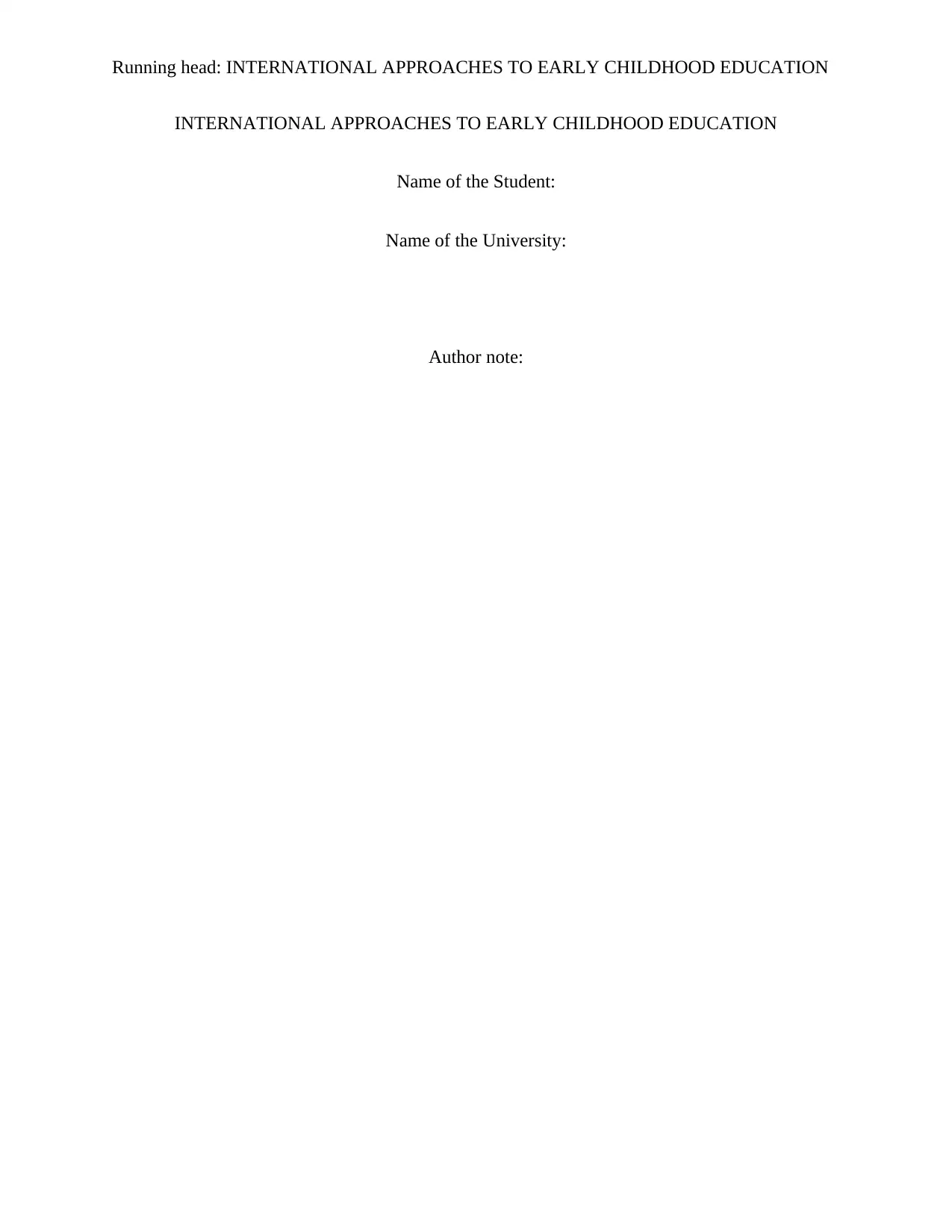
Running head: INTERNATIONAL APPROACHES TO EARLY CHILDHOOD EDUCATION
INTERNATIONAL APPROACHES TO EARLY CHILDHOOD EDUCATION
Name of the Student:
Name of the University:
Author note:
INTERNATIONAL APPROACHES TO EARLY CHILDHOOD EDUCATION
Name of the Student:
Name of the University:
Author note:
Paraphrase This Document
Need a fresh take? Get an instant paraphrase of this document with our AI Paraphraser
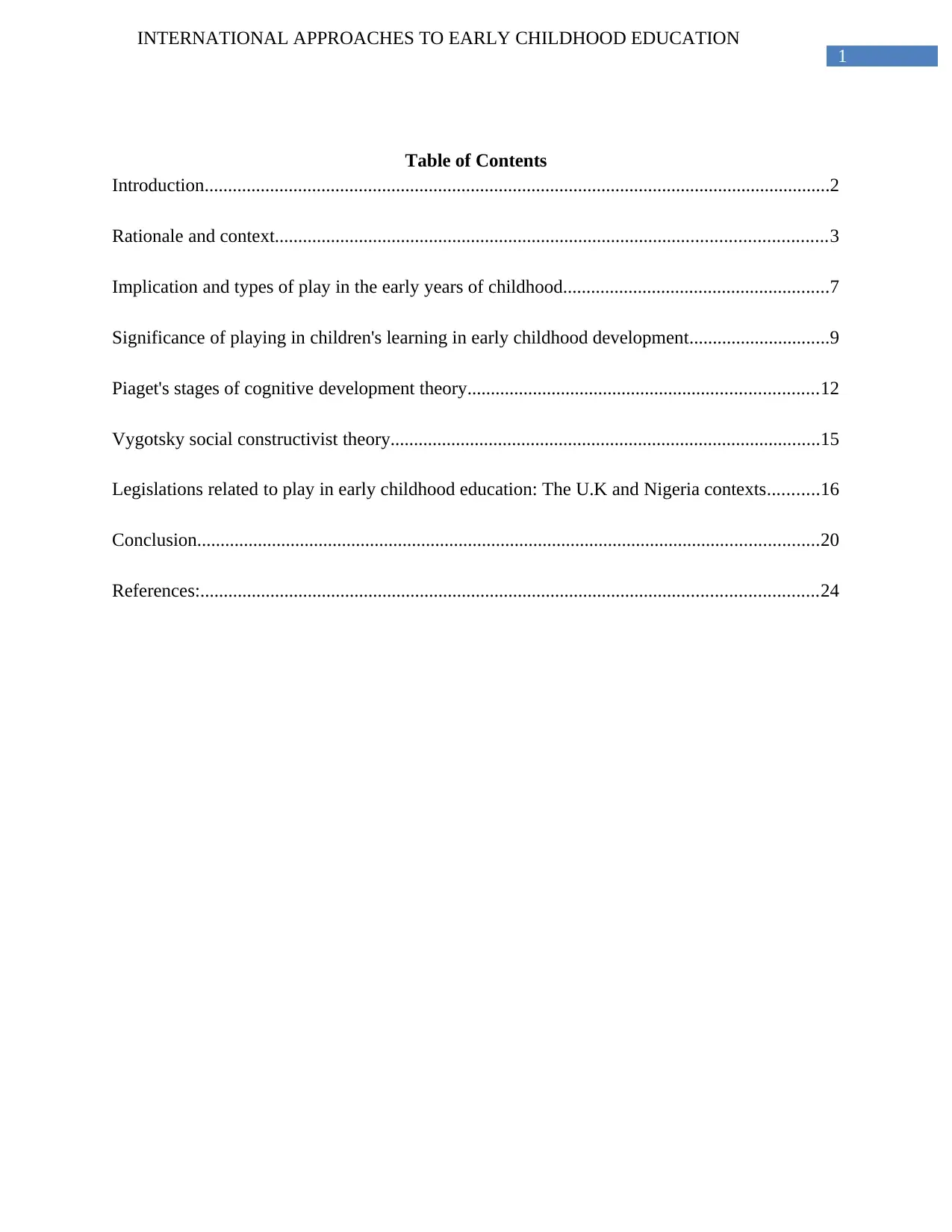
1
INTERNATIONAL APPROACHES TO EARLY CHILDHOOD EDUCATION
Table of Contents
Introduction......................................................................................................................................2
Rationale and context......................................................................................................................3
Implication and types of play in the early years of childhood.........................................................7
Significance of playing in children's learning in early childhood development..............................9
Piaget's stages of cognitive development theory...........................................................................12
Vygotsky social constructivist theory............................................................................................15
Legislations related to play in early childhood education: The U.K and Nigeria contexts...........16
Conclusion.....................................................................................................................................20
References:....................................................................................................................................24
INTERNATIONAL APPROACHES TO EARLY CHILDHOOD EDUCATION
Table of Contents
Introduction......................................................................................................................................2
Rationale and context......................................................................................................................3
Implication and types of play in the early years of childhood.........................................................7
Significance of playing in children's learning in early childhood development..............................9
Piaget's stages of cognitive development theory...........................................................................12
Vygotsky social constructivist theory............................................................................................15
Legislations related to play in early childhood education: The U.K and Nigeria contexts...........16
Conclusion.....................................................................................................................................20
References:....................................................................................................................................24
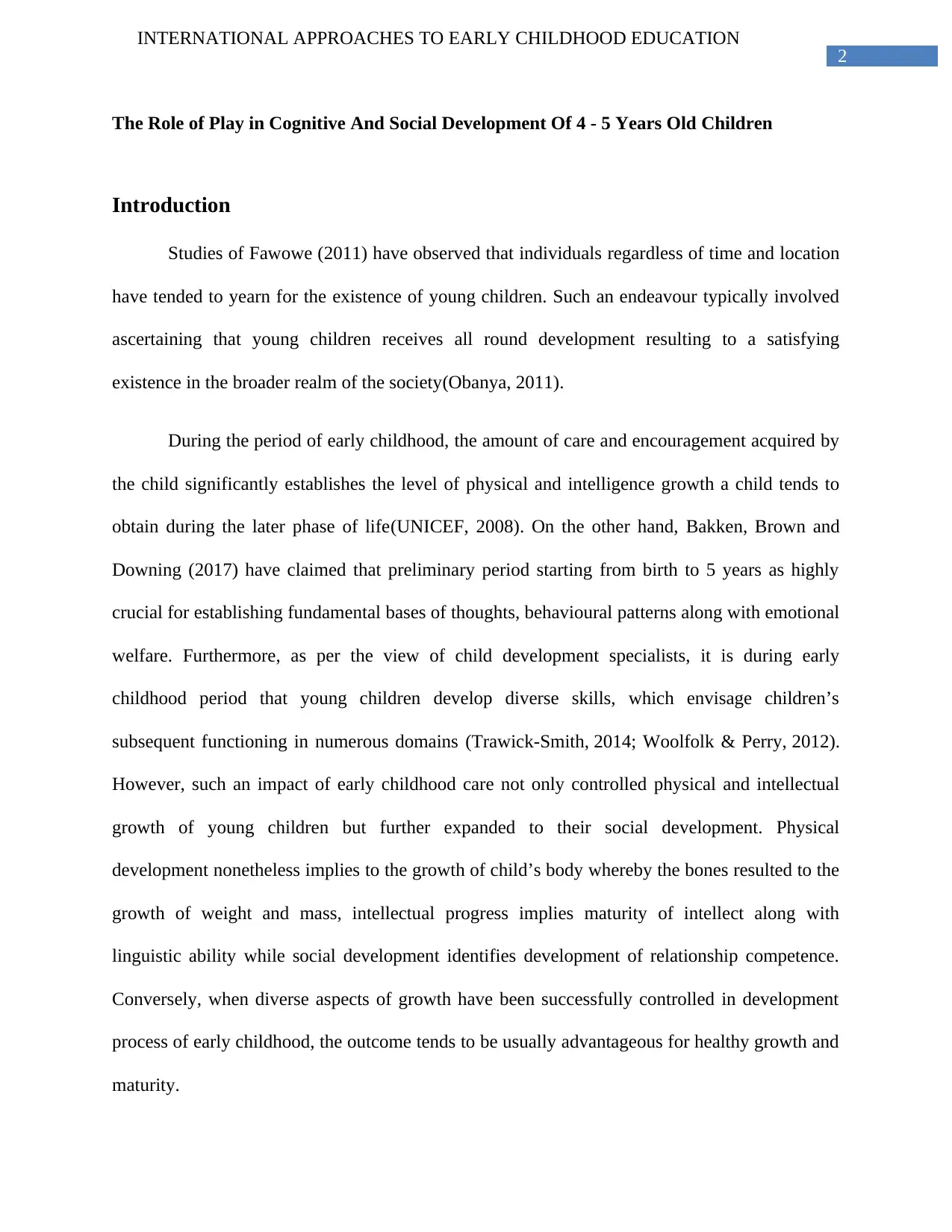
2
INTERNATIONAL APPROACHES TO EARLY CHILDHOOD EDUCATION
The Role of Play in Cognitive And Social Development Of 4 - 5 Years Old Children
Introduction
Studies of Fawowe (2011) have observed that individuals regardless of time and location
have tended to yearn for the existence of young children. Such an endeavour typically involved
ascertaining that young children receives all round development resulting to a satisfying
existence in the broader realm of the society(Obanya, 2011).
During the period of early childhood, the amount of care and encouragement acquired by
the child significantly establishes the level of physical and intelligence growth a child tends to
obtain during the later phase of life(UNICEF, 2008). On the other hand, Bakken, Brown and
Downing (2017) have claimed that preliminary period starting from birth to 5 years as highly
crucial for establishing fundamental bases of thoughts, behavioural patterns along with emotional
welfare. Furthermore, as per the view of child development specialists, it is during early
childhood period that young children develop diverse skills, which envisage children’s
subsequent functioning in numerous domains (Trawick-Smith, 2014; Woolfolk & Perry, 2012).
However, such an impact of early childhood care not only controlled physical and intellectual
growth of young children but further expanded to their social development. Physical
development nonetheless implies to the growth of child’s body whereby the bones resulted to the
growth of weight and mass, intellectual progress implies maturity of intellect along with
linguistic ability while social development identifies development of relationship competence.
Conversely, when diverse aspects of growth have been successfully controlled in development
process of early childhood, the outcome tends to be usually advantageous for healthy growth and
maturity.
INTERNATIONAL APPROACHES TO EARLY CHILDHOOD EDUCATION
The Role of Play in Cognitive And Social Development Of 4 - 5 Years Old Children
Introduction
Studies of Fawowe (2011) have observed that individuals regardless of time and location
have tended to yearn for the existence of young children. Such an endeavour typically involved
ascertaining that young children receives all round development resulting to a satisfying
existence in the broader realm of the society(Obanya, 2011).
During the period of early childhood, the amount of care and encouragement acquired by
the child significantly establishes the level of physical and intelligence growth a child tends to
obtain during the later phase of life(UNICEF, 2008). On the other hand, Bakken, Brown and
Downing (2017) have claimed that preliminary period starting from birth to 5 years as highly
crucial for establishing fundamental bases of thoughts, behavioural patterns along with emotional
welfare. Furthermore, as per the view of child development specialists, it is during early
childhood period that young children develop diverse skills, which envisage children’s
subsequent functioning in numerous domains (Trawick-Smith, 2014; Woolfolk & Perry, 2012).
However, such an impact of early childhood care not only controlled physical and intellectual
growth of young children but further expanded to their social development. Physical
development nonetheless implies to the growth of child’s body whereby the bones resulted to the
growth of weight and mass, intellectual progress implies maturity of intellect along with
linguistic ability while social development identifies development of relationship competence.
Conversely, when diverse aspects of growth have been successfully controlled in development
process of early childhood, the outcome tends to be usually advantageous for healthy growth and
maturity.
⊘ This is a preview!⊘
Do you want full access?
Subscribe today to unlock all pages.

Trusted by 1+ million students worldwide
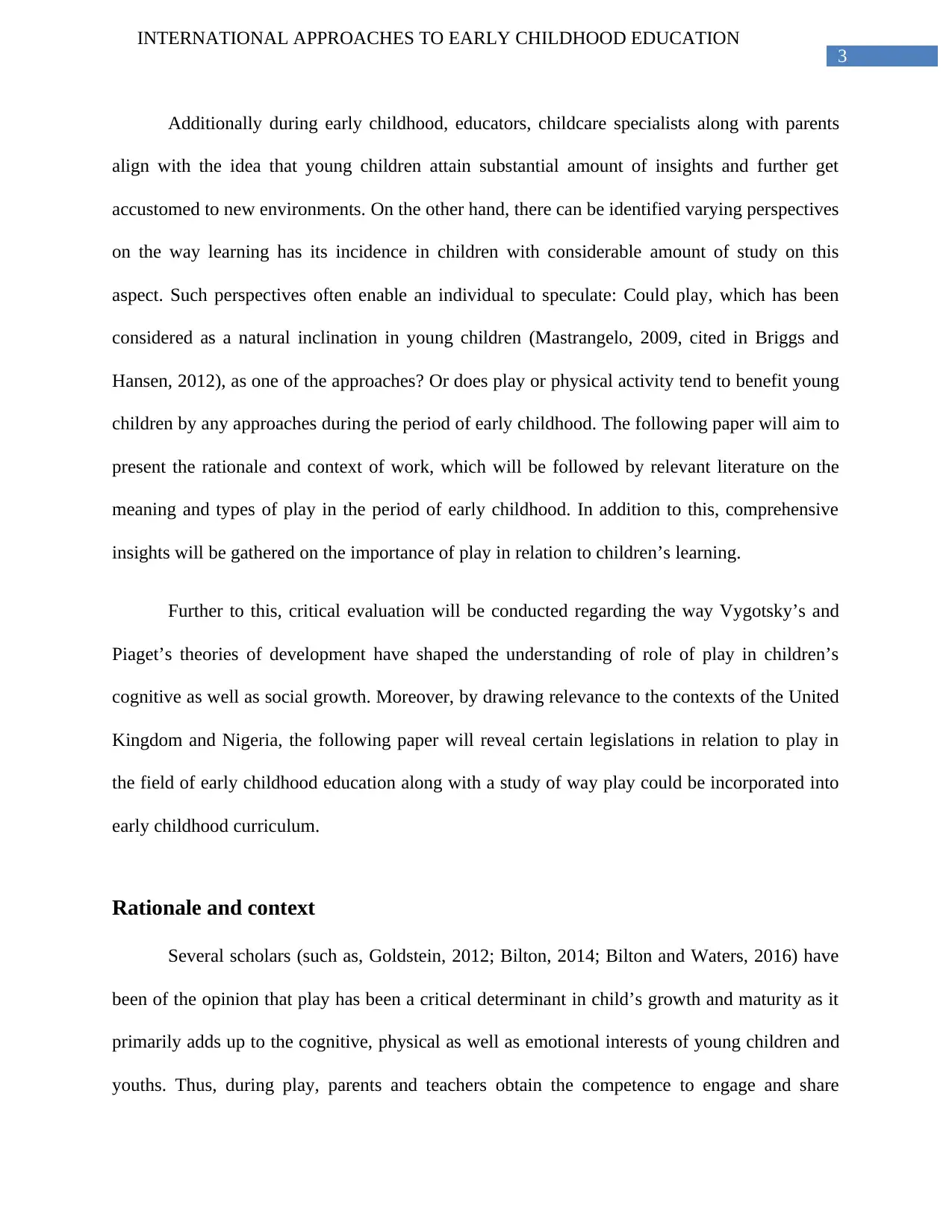
3
INTERNATIONAL APPROACHES TO EARLY CHILDHOOD EDUCATION
Additionally during early childhood, educators, childcare specialists along with parents
align with the idea that young children attain substantial amount of insights and further get
accustomed to new environments. On the other hand, there can be identified varying perspectives
on the way learning has its incidence in children with considerable amount of study on this
aspect. Such perspectives often enable an individual to speculate: Could play, which has been
considered as a natural inclination in young children (Mastrangelo, 2009, cited in Briggs and
Hansen, 2012), as one of the approaches? Or does play or physical activity tend to benefit young
children by any approaches during the period of early childhood. The following paper will aim to
present the rationale and context of work, which will be followed by relevant literature on the
meaning and types of play in the period of early childhood. In addition to this, comprehensive
insights will be gathered on the importance of play in relation to children’s learning.
Further to this, critical evaluation will be conducted regarding the way Vygotsky’s and
Piaget’s theories of development have shaped the understanding of role of play in children’s
cognitive as well as social growth. Moreover, by drawing relevance to the contexts of the United
Kingdom and Nigeria, the following paper will reveal certain legislations in relation to play in
the field of early childhood education along with a study of way play could be incorporated into
early childhood curriculum.
Rationale and context
Several scholars (such as, Goldstein, 2012; Bilton, 2014; Bilton and Waters, 2016) have
been of the opinion that play has been a critical determinant in child’s growth and maturity as it
primarily adds up to the cognitive, physical as well as emotional interests of young children and
youths. Thus, during play, parents and teachers obtain the competence to engage and share
INTERNATIONAL APPROACHES TO EARLY CHILDHOOD EDUCATION
Additionally during early childhood, educators, childcare specialists along with parents
align with the idea that young children attain substantial amount of insights and further get
accustomed to new environments. On the other hand, there can be identified varying perspectives
on the way learning has its incidence in children with considerable amount of study on this
aspect. Such perspectives often enable an individual to speculate: Could play, which has been
considered as a natural inclination in young children (Mastrangelo, 2009, cited in Briggs and
Hansen, 2012), as one of the approaches? Or does play or physical activity tend to benefit young
children by any approaches during the period of early childhood. The following paper will aim to
present the rationale and context of work, which will be followed by relevant literature on the
meaning and types of play in the period of early childhood. In addition to this, comprehensive
insights will be gathered on the importance of play in relation to children’s learning.
Further to this, critical evaluation will be conducted regarding the way Vygotsky’s and
Piaget’s theories of development have shaped the understanding of role of play in children’s
cognitive as well as social growth. Moreover, by drawing relevance to the contexts of the United
Kingdom and Nigeria, the following paper will reveal certain legislations in relation to play in
the field of early childhood education along with a study of way play could be incorporated into
early childhood curriculum.
Rationale and context
Several scholars (such as, Goldstein, 2012; Bilton, 2014; Bilton and Waters, 2016) have
been of the opinion that play has been a critical determinant in child’s growth and maturity as it
primarily adds up to the cognitive, physical as well as emotional interests of young children and
youths. Thus, during play, parents and teachers obtain the competence to engage and share
Paraphrase This Document
Need a fresh take? Get an instant paraphrase of this document with our AI Paraphraser
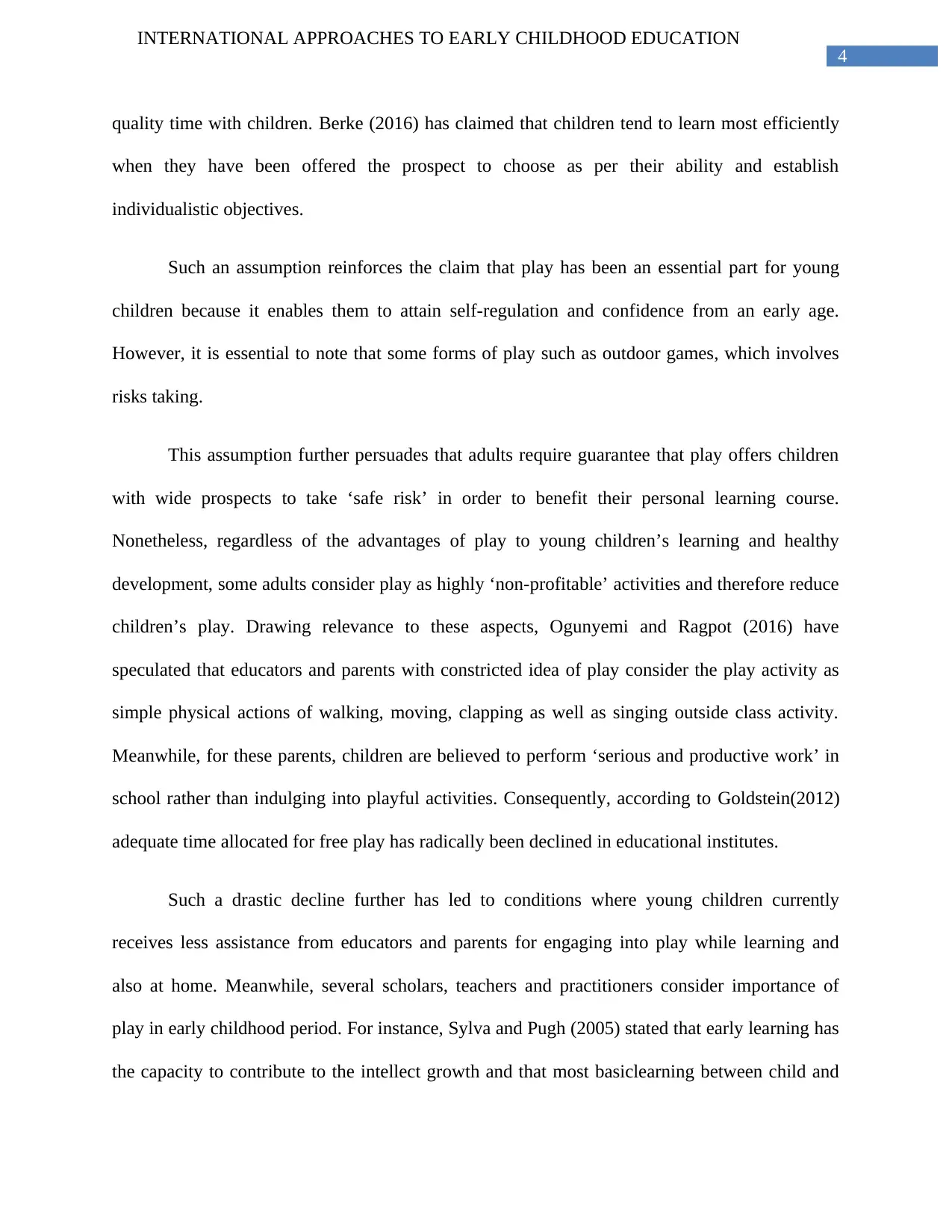
4
INTERNATIONAL APPROACHES TO EARLY CHILDHOOD EDUCATION
quality time with children. Berke (2016) has claimed that children tend to learn most efficiently
when they have been offered the prospect to choose as per their ability and establish
individualistic objectives.
Such an assumption reinforces the claim that play has been an essential part for young
children because it enables them to attain self-regulation and confidence from an early age.
However, it is essential to note that some forms of play such as outdoor games, which involves
risks taking.
This assumption further persuades that adults require guarantee that play offers children
with wide prospects to take ‘safe risk’ in order to benefit their personal learning course.
Nonetheless, regardless of the advantages of play to young children’s learning and healthy
development, some adults consider play as highly ‘non-profitable’ activities and therefore reduce
children’s play. Drawing relevance to these aspects, Ogunyemi and Ragpot (2016) have
speculated that educators and parents with constricted idea of play consider the play activity as
simple physical actions of walking, moving, clapping as well as singing outside class activity.
Meanwhile, for these parents, children are believed to perform ‘serious and productive work’ in
school rather than indulging into playful activities. Consequently, according to Goldstein(2012)
adequate time allocated for free play has radically been declined in educational institutes.
Such a drastic decline further has led to conditions where young children currently
receives less assistance from educators and parents for engaging into play while learning and
also at home. Meanwhile, several scholars, teachers and practitioners consider importance of
play in early childhood period. For instance, Sylva and Pugh (2005) stated that early learning has
the capacity to contribute to the intellect growth and that most basiclearning between child and
INTERNATIONAL APPROACHES TO EARLY CHILDHOOD EDUCATION
quality time with children. Berke (2016) has claimed that children tend to learn most efficiently
when they have been offered the prospect to choose as per their ability and establish
individualistic objectives.
Such an assumption reinforces the claim that play has been an essential part for young
children because it enables them to attain self-regulation and confidence from an early age.
However, it is essential to note that some forms of play such as outdoor games, which involves
risks taking.
This assumption further persuades that adults require guarantee that play offers children
with wide prospects to take ‘safe risk’ in order to benefit their personal learning course.
Nonetheless, regardless of the advantages of play to young children’s learning and healthy
development, some adults consider play as highly ‘non-profitable’ activities and therefore reduce
children’s play. Drawing relevance to these aspects, Ogunyemi and Ragpot (2016) have
speculated that educators and parents with constricted idea of play consider the play activity as
simple physical actions of walking, moving, clapping as well as singing outside class activity.
Meanwhile, for these parents, children are believed to perform ‘serious and productive work’ in
school rather than indulging into playful activities. Consequently, according to Goldstein(2012)
adequate time allocated for free play has radically been declined in educational institutes.
Such a drastic decline further has led to conditions where young children currently
receives less assistance from educators and parents for engaging into play while learning and
also at home. Meanwhile, several scholars, teachers and practitioners consider importance of
play in early childhood period. For instance, Sylva and Pugh (2005) stated that early learning has
the capacity to contribute to the intellect growth and that most basiclearning between child and
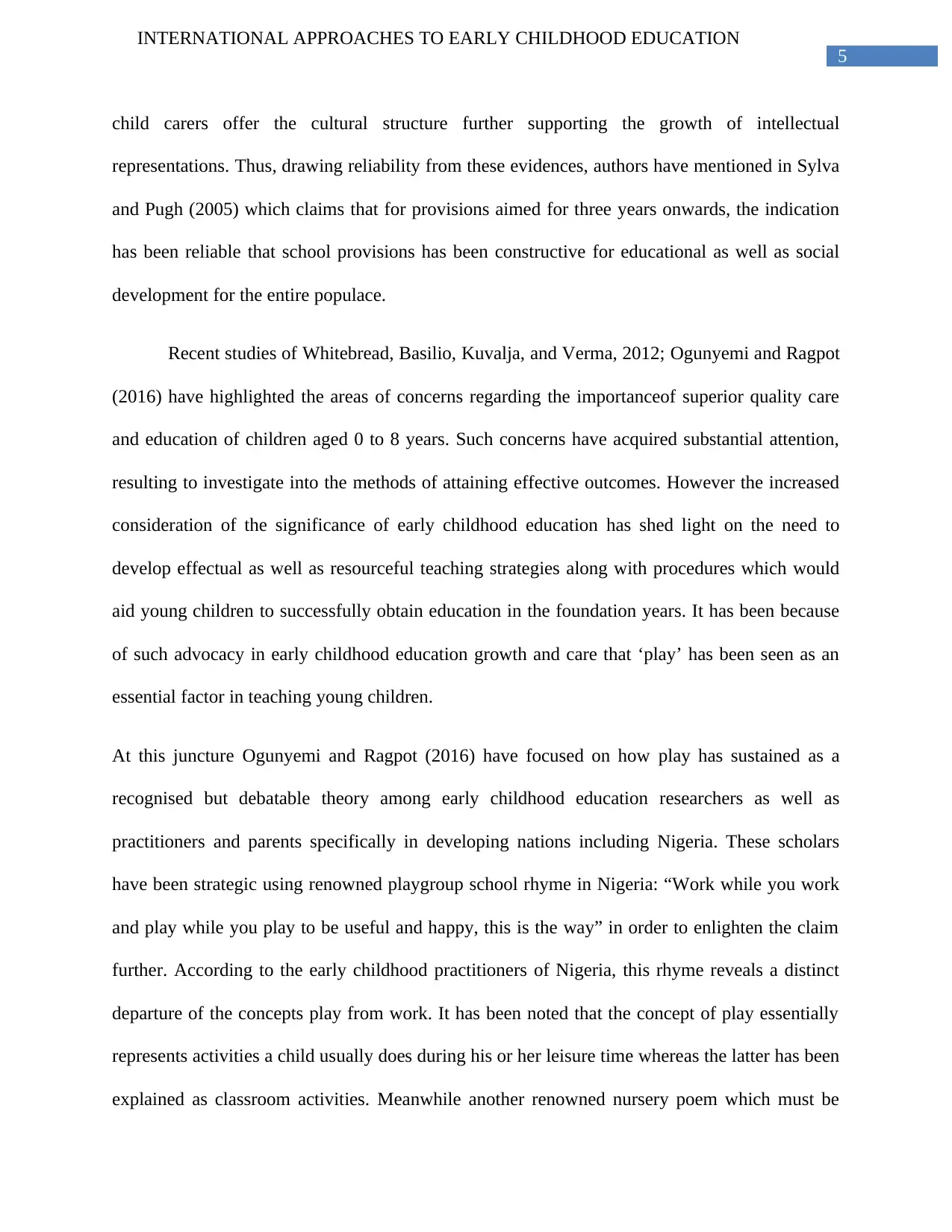
5
INTERNATIONAL APPROACHES TO EARLY CHILDHOOD EDUCATION
child carers offer the cultural structure further supporting the growth of intellectual
representations. Thus, drawing reliability from these evidences, authors have mentioned in Sylva
and Pugh (2005) which claims that for provisions aimed for three years onwards, the indication
has been reliable that school provisions has been constructive for educational as well as social
development for the entire populace.
Recent studies of Whitebread, Basilio, Kuvalja, and Verma, 2012; Ogunyemi and Ragpot
(2016) have highlighted the areas of concerns regarding the importanceof superior quality care
and education of children aged 0 to 8 years. Such concerns have acquired substantial attention,
resulting to investigate into the methods of attaining effective outcomes. However the increased
consideration of the significance of early childhood education has shed light on the need to
develop effectual as well as resourceful teaching strategies along with procedures which would
aid young children to successfully obtain education in the foundation years. It has been because
of such advocacy in early childhood education growth and care that ‘play’ has been seen as an
essential factor in teaching young children.
At this juncture Ogunyemi and Ragpot (2016) have focused on how play has sustained as a
recognised but debatable theory among early childhood education researchers as well as
practitioners and parents specifically in developing nations including Nigeria. These scholars
have been strategic using renowned playgroup school rhyme in Nigeria: “Work while you work
and play while you play to be useful and happy, this is the way” in order to enlighten the claim
further. According to the early childhood practitioners of Nigeria, this rhyme reveals a distinct
departure of the concepts play from work. It has been noted that the concept of play essentially
represents activities a child usually does during his or her leisure time whereas the latter has been
explained as classroom activities. Meanwhile another renowned nursery poem which must be
INTERNATIONAL APPROACHES TO EARLY CHILDHOOD EDUCATION
child carers offer the cultural structure further supporting the growth of intellectual
representations. Thus, drawing reliability from these evidences, authors have mentioned in Sylva
and Pugh (2005) which claims that for provisions aimed for three years onwards, the indication
has been reliable that school provisions has been constructive for educational as well as social
development for the entire populace.
Recent studies of Whitebread, Basilio, Kuvalja, and Verma, 2012; Ogunyemi and Ragpot
(2016) have highlighted the areas of concerns regarding the importanceof superior quality care
and education of children aged 0 to 8 years. Such concerns have acquired substantial attention,
resulting to investigate into the methods of attaining effective outcomes. However the increased
consideration of the significance of early childhood education has shed light on the need to
develop effectual as well as resourceful teaching strategies along with procedures which would
aid young children to successfully obtain education in the foundation years. It has been because
of such advocacy in early childhood education growth and care that ‘play’ has been seen as an
essential factor in teaching young children.
At this juncture Ogunyemi and Ragpot (2016) have focused on how play has sustained as a
recognised but debatable theory among early childhood education researchers as well as
practitioners and parents specifically in developing nations including Nigeria. These scholars
have been strategic using renowned playgroup school rhyme in Nigeria: “Work while you work
and play while you play to be useful and happy, this is the way” in order to enlighten the claim
further. According to the early childhood practitioners of Nigeria, this rhyme reveals a distinct
departure of the concepts play from work. It has been noted that the concept of play essentially
represents activities a child usually does during his or her leisure time whereas the latter has been
explained as classroom activities. Meanwhile another renowned nursery poem which must be
⊘ This is a preview!⊘
Do you want full access?
Subscribe today to unlock all pages.

Trusted by 1+ million students worldwide
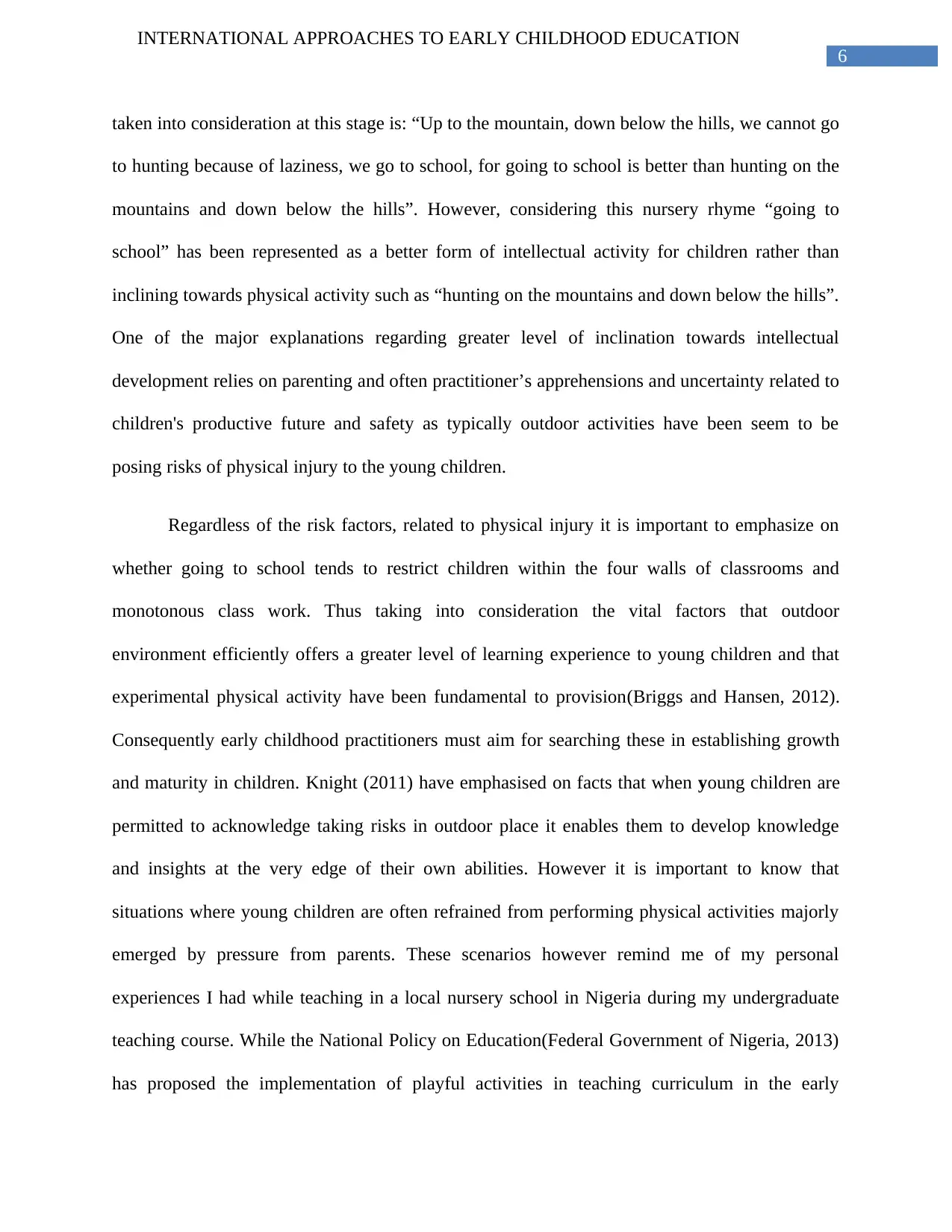
6
INTERNATIONAL APPROACHES TO EARLY CHILDHOOD EDUCATION
taken into consideration at this stage is: “Up to the mountain, down below the hills, we cannot go
to hunting because of laziness, we go to school, for going to school is better than hunting on the
mountains and down below the hills”. However, considering this nursery rhyme “going to
school” has been represented as a better form of intellectual activity for children rather than
inclining towards physical activity such as “hunting on the mountains and down below the hills”.
One of the major explanations regarding greater level of inclination towards intellectual
development relies on parenting and often practitioner’s apprehensions and uncertainty related to
children's productive future and safety as typically outdoor activities have been seem to be
posing risks of physical injury to the young children.
Regardless of the risk factors, related to physical injury it is important to emphasize on
whether going to school tends to restrict children within the four walls of classrooms and
monotonous class work. Thus taking into consideration the vital factors that outdoor
environment efficiently offers a greater level of learning experience to young children and that
experimental physical activity have been fundamental to provision(Briggs and Hansen, 2012).
Consequently early childhood practitioners must aim for searching these in establishing growth
and maturity in children. Knight (2011) have emphasised on facts that when young children are
permitted to acknowledge taking risks in outdoor place it enables them to develop knowledge
and insights at the very edge of their own abilities. However it is important to know that
situations where young children are often refrained from performing physical activities majorly
emerged by pressure from parents. These scenarios however remind me of my personal
experiences I had while teaching in a local nursery school in Nigeria during my undergraduate
teaching course. While the National Policy on Education(Federal Government of Nigeria, 2013)
has proposed the implementation of playful activities in teaching curriculum in the early
INTERNATIONAL APPROACHES TO EARLY CHILDHOOD EDUCATION
taken into consideration at this stage is: “Up to the mountain, down below the hills, we cannot go
to hunting because of laziness, we go to school, for going to school is better than hunting on the
mountains and down below the hills”. However, considering this nursery rhyme “going to
school” has been represented as a better form of intellectual activity for children rather than
inclining towards physical activity such as “hunting on the mountains and down below the hills”.
One of the major explanations regarding greater level of inclination towards intellectual
development relies on parenting and often practitioner’s apprehensions and uncertainty related to
children's productive future and safety as typically outdoor activities have been seem to be
posing risks of physical injury to the young children.
Regardless of the risk factors, related to physical injury it is important to emphasize on
whether going to school tends to restrict children within the four walls of classrooms and
monotonous class work. Thus taking into consideration the vital factors that outdoor
environment efficiently offers a greater level of learning experience to young children and that
experimental physical activity have been fundamental to provision(Briggs and Hansen, 2012).
Consequently early childhood practitioners must aim for searching these in establishing growth
and maturity in children. Knight (2011) have emphasised on facts that when young children are
permitted to acknowledge taking risks in outdoor place it enables them to develop knowledge
and insights at the very edge of their own abilities. However it is important to know that
situations where young children are often refrained from performing physical activities majorly
emerged by pressure from parents. These scenarios however remind me of my personal
experiences I had while teaching in a local nursery school in Nigeria during my undergraduate
teaching course. While the National Policy on Education(Federal Government of Nigeria, 2013)
has proposed the implementation of playful activities in teaching curriculum in the early
Paraphrase This Document
Need a fresh take? Get an instant paraphrase of this document with our AI Paraphraser
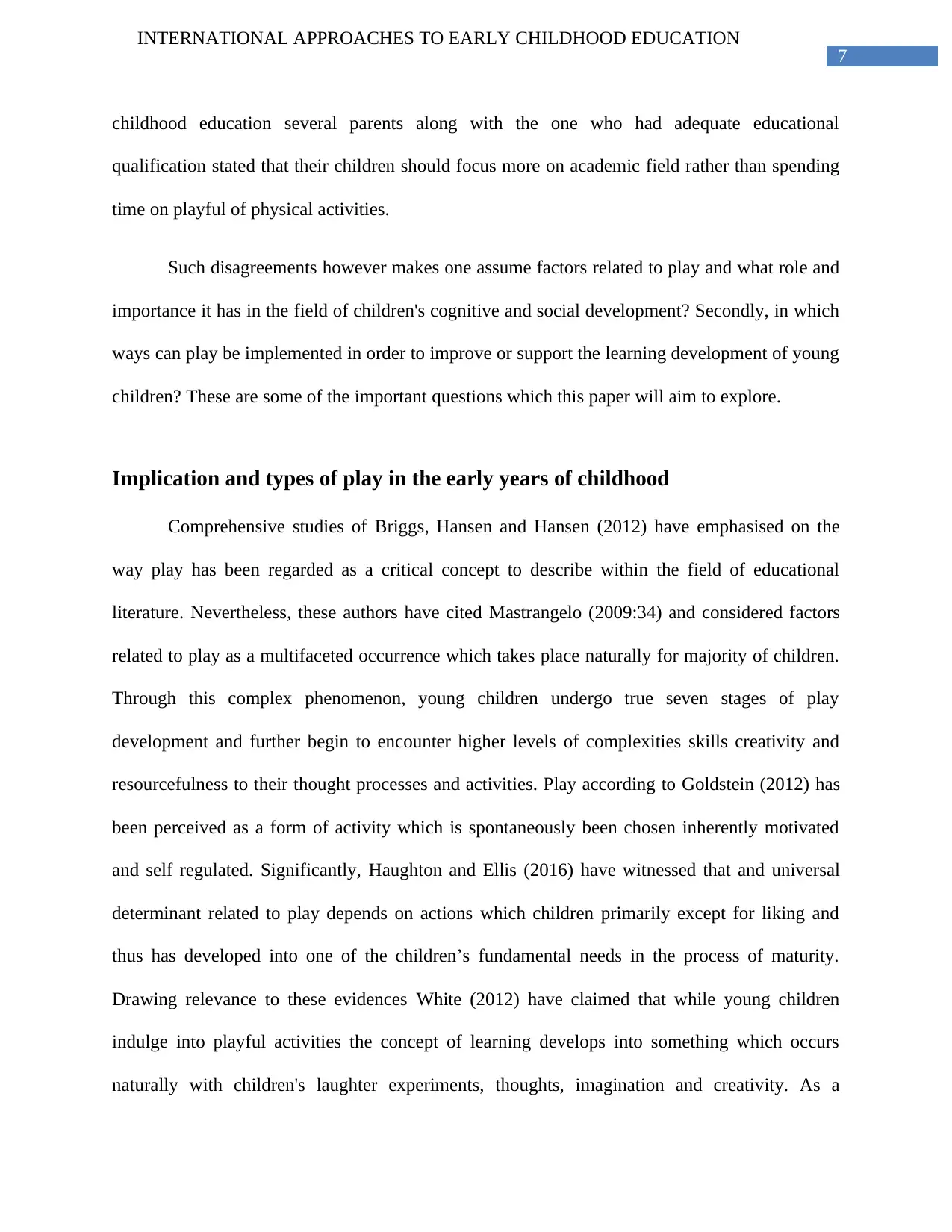
7
INTERNATIONAL APPROACHES TO EARLY CHILDHOOD EDUCATION
childhood education several parents along with the one who had adequate educational
qualification stated that their children should focus more on academic field rather than spending
time on playful of physical activities.
Such disagreements however makes one assume factors related to play and what role and
importance it has in the field of children's cognitive and social development? Secondly, in which
ways can play be implemented in order to improve or support the learning development of young
children? These are some of the important questions which this paper will aim to explore.
Implication and types of play in the early years of childhood
Comprehensive studies of Briggs, Hansen and Hansen (2012) have emphasised on the
way play has been regarded as a critical concept to describe within the field of educational
literature. Nevertheless, these authors have cited Mastrangelo (2009:34) and considered factors
related to play as a multifaceted occurrence which takes place naturally for majority of children.
Through this complex phenomenon, young children undergo true seven stages of play
development and further begin to encounter higher levels of complexities skills creativity and
resourcefulness to their thought processes and activities. Play according to Goldstein (2012) has
been perceived as a form of activity which is spontaneously been chosen inherently motivated
and self regulated. Significantly, Haughton and Ellis (2016) have witnessed that and universal
determinant related to play depends on actions which children primarily except for liking and
thus has developed into one of the children’s fundamental needs in the process of maturity.
Drawing relevance to these evidences White (2012) have claimed that while young children
indulge into playful activities the concept of learning develops into something which occurs
naturally with children's laughter experiments, thoughts, imagination and creativity. As a
INTERNATIONAL APPROACHES TO EARLY CHILDHOOD EDUCATION
childhood education several parents along with the one who had adequate educational
qualification stated that their children should focus more on academic field rather than spending
time on playful of physical activities.
Such disagreements however makes one assume factors related to play and what role and
importance it has in the field of children's cognitive and social development? Secondly, in which
ways can play be implemented in order to improve or support the learning development of young
children? These are some of the important questions which this paper will aim to explore.
Implication and types of play in the early years of childhood
Comprehensive studies of Briggs, Hansen and Hansen (2012) have emphasised on the
way play has been regarded as a critical concept to describe within the field of educational
literature. Nevertheless, these authors have cited Mastrangelo (2009:34) and considered factors
related to play as a multifaceted occurrence which takes place naturally for majority of children.
Through this complex phenomenon, young children undergo true seven stages of play
development and further begin to encounter higher levels of complexities skills creativity and
resourcefulness to their thought processes and activities. Play according to Goldstein (2012) has
been perceived as a form of activity which is spontaneously been chosen inherently motivated
and self regulated. Significantly, Haughton and Ellis (2016) have witnessed that and universal
determinant related to play depends on actions which children primarily except for liking and
thus has developed into one of the children’s fundamental needs in the process of maturity.
Drawing relevance to these evidences White (2012) have claimed that while young children
indulge into playful activities the concept of learning develops into something which occurs
naturally with children's laughter experiments, thoughts, imagination and creativity. As a
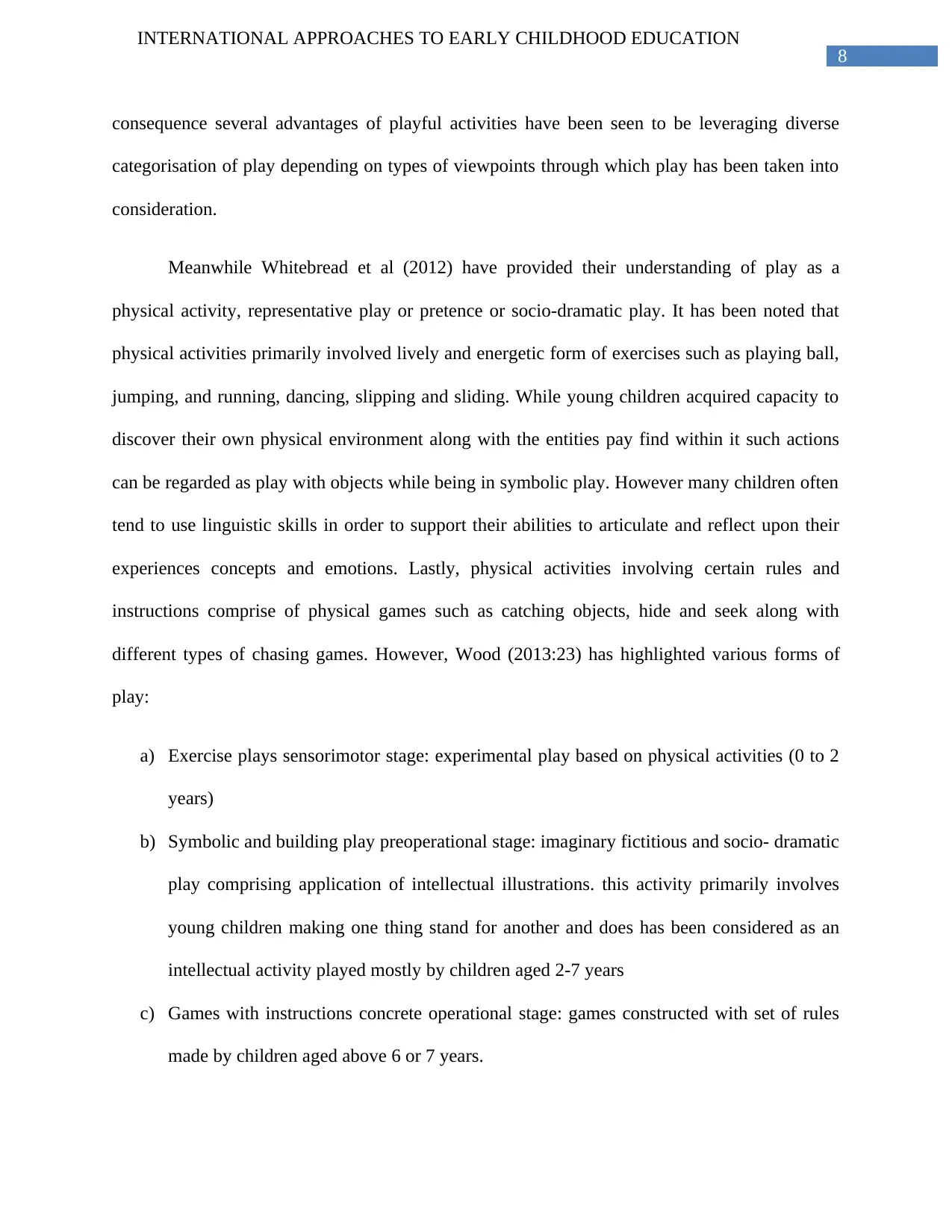
8
INTERNATIONAL APPROACHES TO EARLY CHILDHOOD EDUCATION
consequence several advantages of playful activities have been seen to be leveraging diverse
categorisation of play depending on types of viewpoints through which play has been taken into
consideration.
Meanwhile Whitebread et al (2012) have provided their understanding of play as a
physical activity, representative play or pretence or socio-dramatic play. It has been noted that
physical activities primarily involved lively and energetic form of exercises such as playing ball,
jumping, and running, dancing, slipping and sliding. While young children acquired capacity to
discover their own physical environment along with the entities pay find within it such actions
can be regarded as play with objects while being in symbolic play. However many children often
tend to use linguistic skills in order to support their abilities to articulate and reflect upon their
experiences concepts and emotions. Lastly, physical activities involving certain rules and
instructions comprise of physical games such as catching objects, hide and seek along with
different types of chasing games. However, Wood (2013:23) has highlighted various forms of
play:
a) Exercise plays sensorimotor stage: experimental play based on physical activities (0 to 2
years)
b) Symbolic and building play preoperational stage: imaginary fictitious and socio- dramatic
play comprising application of intellectual illustrations. this activity primarily involves
young children making one thing stand for another and does has been considered as an
intellectual activity played mostly by children aged 2-7 years
c) Games with instructions concrete operational stage: games constructed with set of rules
made by children aged above 6 or 7 years.
INTERNATIONAL APPROACHES TO EARLY CHILDHOOD EDUCATION
consequence several advantages of playful activities have been seen to be leveraging diverse
categorisation of play depending on types of viewpoints through which play has been taken into
consideration.
Meanwhile Whitebread et al (2012) have provided their understanding of play as a
physical activity, representative play or pretence or socio-dramatic play. It has been noted that
physical activities primarily involved lively and energetic form of exercises such as playing ball,
jumping, and running, dancing, slipping and sliding. While young children acquired capacity to
discover their own physical environment along with the entities pay find within it such actions
can be regarded as play with objects while being in symbolic play. However many children often
tend to use linguistic skills in order to support their abilities to articulate and reflect upon their
experiences concepts and emotions. Lastly, physical activities involving certain rules and
instructions comprise of physical games such as catching objects, hide and seek along with
different types of chasing games. However, Wood (2013:23) has highlighted various forms of
play:
a) Exercise plays sensorimotor stage: experimental play based on physical activities (0 to 2
years)
b) Symbolic and building play preoperational stage: imaginary fictitious and socio- dramatic
play comprising application of intellectual illustrations. this activity primarily involves
young children making one thing stand for another and does has been considered as an
intellectual activity played mostly by children aged 2-7 years
c) Games with instructions concrete operational stage: games constructed with set of rules
made by children aged above 6 or 7 years.
⊘ This is a preview!⊘
Do you want full access?
Subscribe today to unlock all pages.

Trusted by 1+ million students worldwide
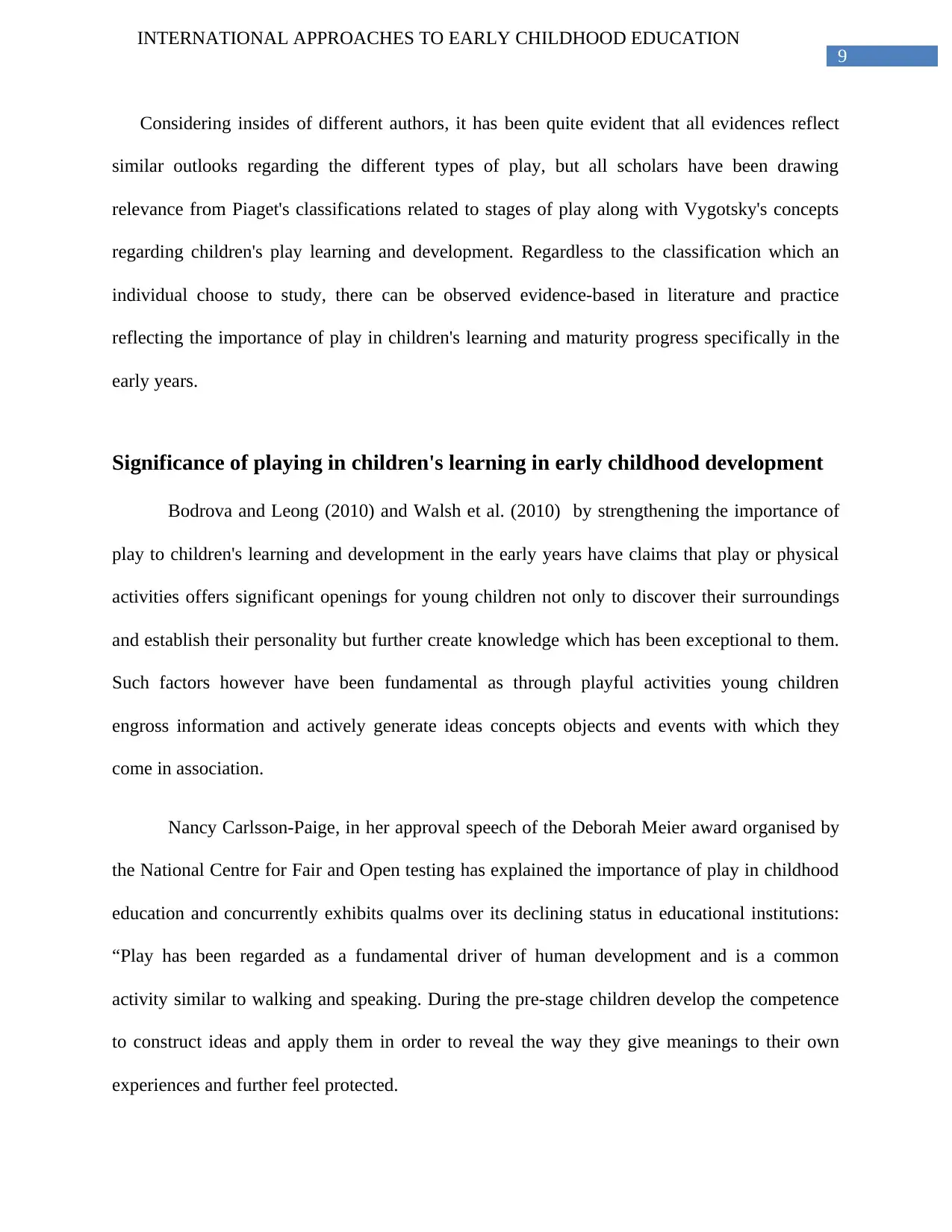
9
INTERNATIONAL APPROACHES TO EARLY CHILDHOOD EDUCATION
Considering insides of different authors, it has been quite evident that all evidences reflect
similar outlooks regarding the different types of play, but all scholars have been drawing
relevance from Piaget's classifications related to stages of play along with Vygotsky's concepts
regarding children's play learning and development. Regardless to the classification which an
individual choose to study, there can be observed evidence-based in literature and practice
reflecting the importance of play in children's learning and maturity progress specifically in the
early years.
Significance of playing in children's learning in early childhood development
Bodrova and Leong (2010) and Walsh et al. (2010) by strengthening the importance of
play to children's learning and development in the early years have claims that play or physical
activities offers significant openings for young children not only to discover their surroundings
and establish their personality but further create knowledge which has been exceptional to them.
Such factors however have been fundamental as through playful activities young children
engross information and actively generate ideas concepts objects and events with which they
come in association.
Nancy Carlsson-Paige, in her approval speech of the Deborah Meier award organised by
the National Centre for Fair and Open testing has explained the importance of play in childhood
education and concurrently exhibits qualms over its declining status in educational institutions:
“Play has been regarded as a fundamental driver of human development and is a common
activity similar to walking and speaking. During the pre-stage children develop the competence
to construct ideas and apply them in order to reveal the way they give meanings to their own
experiences and further feel protected.
INTERNATIONAL APPROACHES TO EARLY CHILDHOOD EDUCATION
Considering insides of different authors, it has been quite evident that all evidences reflect
similar outlooks regarding the different types of play, but all scholars have been drawing
relevance from Piaget's classifications related to stages of play along with Vygotsky's concepts
regarding children's play learning and development. Regardless to the classification which an
individual choose to study, there can be observed evidence-based in literature and practice
reflecting the importance of play in children's learning and maturity progress specifically in the
early years.
Significance of playing in children's learning in early childhood development
Bodrova and Leong (2010) and Walsh et al. (2010) by strengthening the importance of
play to children's learning and development in the early years have claims that play or physical
activities offers significant openings for young children not only to discover their surroundings
and establish their personality but further create knowledge which has been exceptional to them.
Such factors however have been fundamental as through playful activities young children
engross information and actively generate ideas concepts objects and events with which they
come in association.
Nancy Carlsson-Paige, in her approval speech of the Deborah Meier award organised by
the National Centre for Fair and Open testing has explained the importance of play in childhood
education and concurrently exhibits qualms over its declining status in educational institutions:
“Play has been regarded as a fundamental driver of human development and is a common
activity similar to walking and speaking. During the pre-stage children develop the competence
to construct ideas and apply them in order to reveal the way they give meanings to their own
experiences and further feel protected.
Paraphrase This Document
Need a fresh take? Get an instant paraphrase of this document with our AI Paraphraser
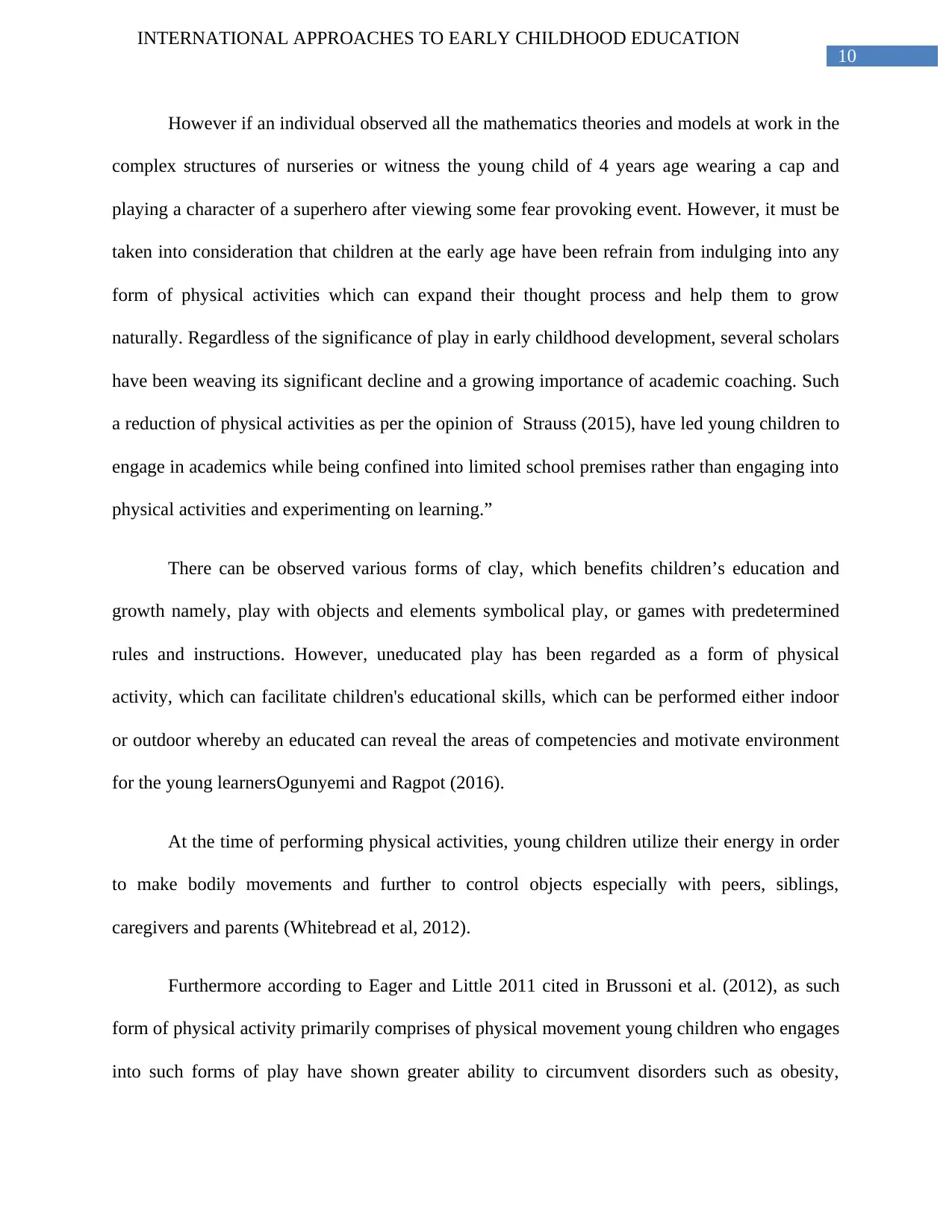
10
INTERNATIONAL APPROACHES TO EARLY CHILDHOOD EDUCATION
However if an individual observed all the mathematics theories and models at work in the
complex structures of nurseries or witness the young child of 4 years age wearing a cap and
playing a character of a superhero after viewing some fear provoking event. However, it must be
taken into consideration that children at the early age have been refrain from indulging into any
form of physical activities which can expand their thought process and help them to grow
naturally. Regardless of the significance of play in early childhood development, several scholars
have been weaving its significant decline and a growing importance of academic coaching. Such
a reduction of physical activities as per the opinion of Strauss (2015), have led young children to
engage in academics while being confined into limited school premises rather than engaging into
physical activities and experimenting on learning.”
There can be observed various forms of clay, which benefits children’s education and
growth namely, play with objects and elements symbolical play, or games with predetermined
rules and instructions. However, uneducated play has been regarded as a form of physical
activity, which can facilitate children's educational skills, which can be performed either indoor
or outdoor whereby an educated can reveal the areas of competencies and motivate environment
for the young learnersOgunyemi and Ragpot (2016).
At the time of performing physical activities, young children utilize their energy in order
to make bodily movements and further to control objects especially with peers, siblings,
caregivers and parents (Whitebread et al, 2012).
Furthermore according to Eager and Little 2011 cited in Brussoni et al. (2012), as such
form of physical activity primarily comprises of physical movement young children who engages
into such forms of play have shown greater ability to circumvent disorders such as obesity,
INTERNATIONAL APPROACHES TO EARLY CHILDHOOD EDUCATION
However if an individual observed all the mathematics theories and models at work in the
complex structures of nurseries or witness the young child of 4 years age wearing a cap and
playing a character of a superhero after viewing some fear provoking event. However, it must be
taken into consideration that children at the early age have been refrain from indulging into any
form of physical activities which can expand their thought process and help them to grow
naturally. Regardless of the significance of play in early childhood development, several scholars
have been weaving its significant decline and a growing importance of academic coaching. Such
a reduction of physical activities as per the opinion of Strauss (2015), have led young children to
engage in academics while being confined into limited school premises rather than engaging into
physical activities and experimenting on learning.”
There can be observed various forms of clay, which benefits children’s education and
growth namely, play with objects and elements symbolical play, or games with predetermined
rules and instructions. However, uneducated play has been regarded as a form of physical
activity, which can facilitate children's educational skills, which can be performed either indoor
or outdoor whereby an educated can reveal the areas of competencies and motivate environment
for the young learnersOgunyemi and Ragpot (2016).
At the time of performing physical activities, young children utilize their energy in order
to make bodily movements and further to control objects especially with peers, siblings,
caregivers and parents (Whitebread et al, 2012).
Furthermore according to Eager and Little 2011 cited in Brussoni et al. (2012), as such
form of physical activity primarily comprises of physical movement young children who engages
into such forms of play have shown greater ability to circumvent disorders such as obesity,
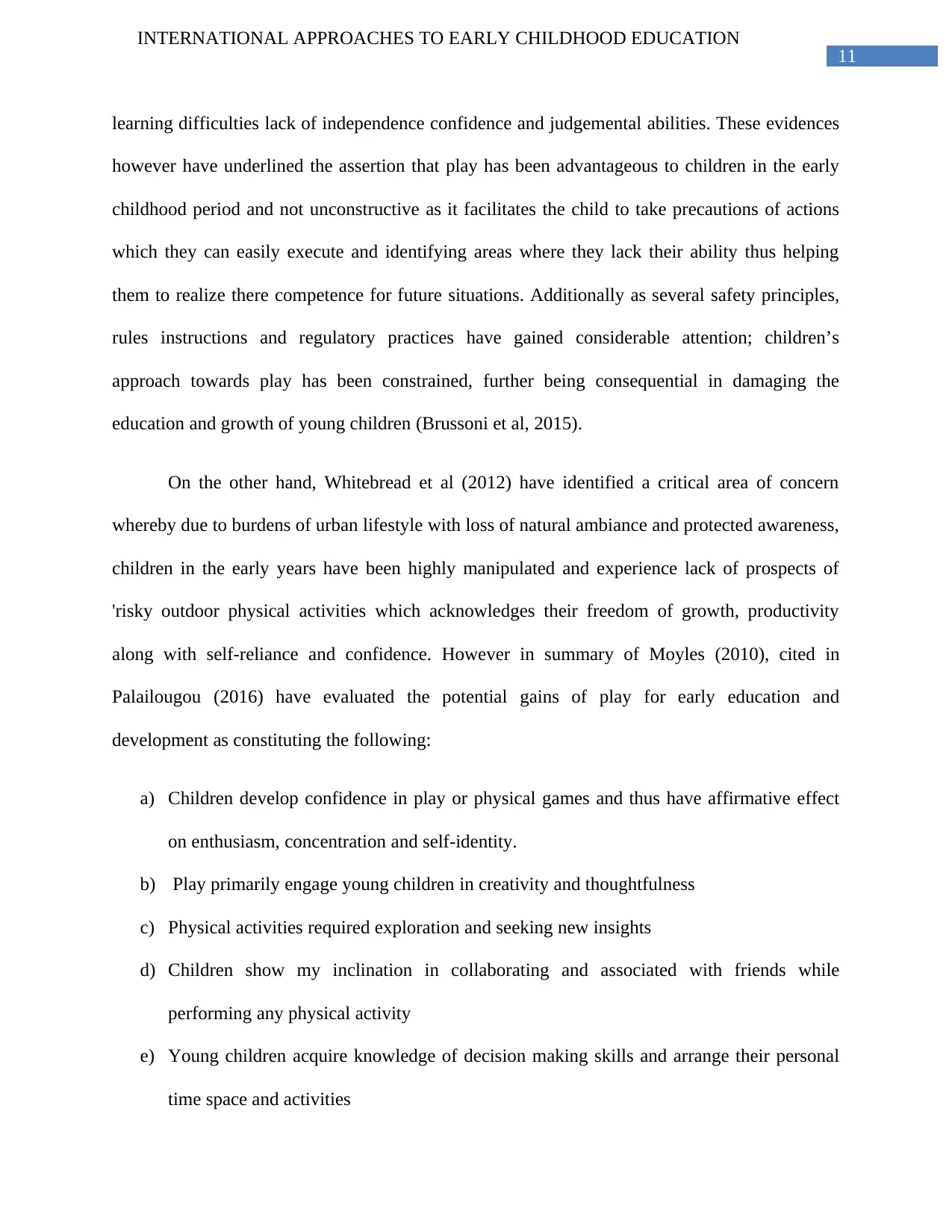
11
INTERNATIONAL APPROACHES TO EARLY CHILDHOOD EDUCATION
learning difficulties lack of independence confidence and judgemental abilities. These evidences
however have underlined the assertion that play has been advantageous to children in the early
childhood period and not unconstructive as it facilitates the child to take precautions of actions
which they can easily execute and identifying areas where they lack their ability thus helping
them to realize there competence for future situations. Additionally as several safety principles,
rules instructions and regulatory practices have gained considerable attention; children’s
approach towards play has been constrained, further being consequential in damaging the
education and growth of young children (Brussoni et al, 2015).
On the other hand, Whitebread et al (2012) have identified a critical area of concern
whereby due to burdens of urban lifestyle with loss of natural ambiance and protected awareness,
children in the early years have been highly manipulated and experience lack of prospects of
'risky outdoor physical activities which acknowledges their freedom of growth, productivity
along with self-reliance and confidence. However in summary of Moyles (2010), cited in
Palailougou (2016) have evaluated the potential gains of play for early education and
development as constituting the following:
a) Children develop confidence in play or physical games and thus have affirmative effect
on enthusiasm, concentration and self-identity.
b) Play primarily engage young children in creativity and thoughtfulness
c) Physical activities required exploration and seeking new insights
d) Children show my inclination in collaborating and associated with friends while
performing any physical activity
e) Young children acquire knowledge of decision making skills and arrange their personal
time space and activities
INTERNATIONAL APPROACHES TO EARLY CHILDHOOD EDUCATION
learning difficulties lack of independence confidence and judgemental abilities. These evidences
however have underlined the assertion that play has been advantageous to children in the early
childhood period and not unconstructive as it facilitates the child to take precautions of actions
which they can easily execute and identifying areas where they lack their ability thus helping
them to realize there competence for future situations. Additionally as several safety principles,
rules instructions and regulatory practices have gained considerable attention; children’s
approach towards play has been constrained, further being consequential in damaging the
education and growth of young children (Brussoni et al, 2015).
On the other hand, Whitebread et al (2012) have identified a critical area of concern
whereby due to burdens of urban lifestyle with loss of natural ambiance and protected awareness,
children in the early years have been highly manipulated and experience lack of prospects of
'risky outdoor physical activities which acknowledges their freedom of growth, productivity
along with self-reliance and confidence. However in summary of Moyles (2010), cited in
Palailougou (2016) have evaluated the potential gains of play for early education and
development as constituting the following:
a) Children develop confidence in play or physical games and thus have affirmative effect
on enthusiasm, concentration and self-identity.
b) Play primarily engage young children in creativity and thoughtfulness
c) Physical activities required exploration and seeking new insights
d) Children show my inclination in collaborating and associated with friends while
performing any physical activity
e) Young children acquire knowledge of decision making skills and arrange their personal
time space and activities
⊘ This is a preview!⊘
Do you want full access?
Subscribe today to unlock all pages.

Trusted by 1+ million students worldwide
1 out of 29
Related Documents
Your All-in-One AI-Powered Toolkit for Academic Success.
+13062052269
info@desklib.com
Available 24*7 on WhatsApp / Email
![[object Object]](/_next/static/media/star-bottom.7253800d.svg)
Unlock your academic potential
Copyright © 2020–2026 A2Z Services. All Rights Reserved. Developed and managed by ZUCOL.




